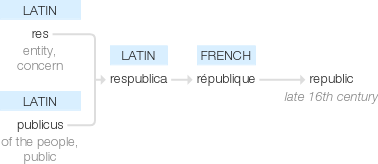Republic
late 16th century: from French république, from Latin respublica, from res ‘entity, concern’ + publicus ‘of the people, public’.
wiktionary
From Middle French republique(“republic”), borrowed from Latin rēpūblicā, ablative singular of rēspūblica(“republic”), from rēs(“thing”) + pūblica(“public”); hence literally “the public thing”.
etymonline
republic (n.)
"state in which supreme or executive power rests in the people via representatives chosen by citizens entitled to vote," c. 1600, from French république (15c.), from Latin respublica (ablative republica) "the common weal, a commonwealth, state, republic," literally res publica "public interest, the state," from res "affair, matter, thing" (see re) + publica, fem. of publicus "public" (see public (adj.)).
Applied to particular states so constituted by 1630s. The notion of "community in which there is a certain equality of members" is behind such expressions as republic of letters "collective body of those engaged in literary pursuits," attested from 1702.
